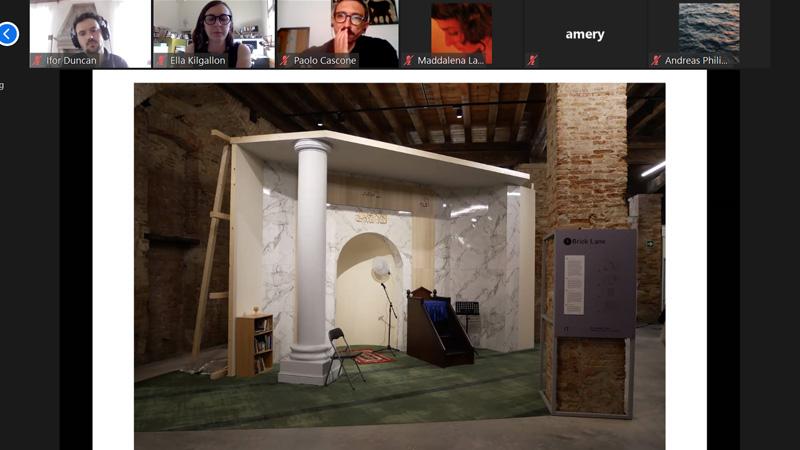The Sustainable Cities and the Urban Environment research community hosted an online event on 9 June to celebrate work by colleagues within the University of Westminster that is being exhibited at the prestigious Venice Biennale until 21 November 2021.

Academics based within the College of Design, Creative and Digital Industries have co-produced three different installations being exhibited at the Venice Biennale which respond to this year’s theme ‘How will we live together?’. .
During the event, each of the curators of the exhibits spoke more about the ideas underpinning each of their pieces of work, as well as discussing how architecture and practice-based research can help us to better understand the world’s most pressing challenges.
The installations presented at the event include one co-produced Professor Lindsay Bremner who led the Monsoon Assemblages project and Professor Neal White who led Office of Experiments. Together, they created an immersive installation about their works that challenges and redefines ideas of border, scale and agency. It draws on climate and field work to convey how climate change and the Anthropocene are resulting in increasing monsoon volatility, shorter rainy seasons and more frequent extreme weather events. Their installation investigates these events through video footage of the flight of the Globe Skimmer dragonfly that follows the monsoon from east Africa to southeast Asia and back again.
Three British Mosques, a pavilion produced by Shahed Saleem in collaboration with the V&A Museum is also being exhibited, which looks at the self-built and often undocumented world of adapted mosques to explore contemporary multiculturalism in London. The work explores three different case studies that illuminate stories of immigration, identity and community aspiration.
The final project celebrated during the online event is a video-installation project of The African Fabbers School (AFS) which was curated by Dr Paolo Cascone and Maddalena Laddaga in the frame of the Italian Pavilion, which proposes an innovative research by practice agenda for the next generation of European and African architects.
Towards the end of the event, Ifor Duncan, an academic based at Ca’ Foscari University of Venice, provided an insightful and eloquent response to the three installations which he had the chance to visit physically in Venice.
Talking about the event, Dr Andrew Smith, Lead of the Sustainable Cities and the Urban Environment research community, said: “It was fantastic that we were able to bring together the people responsible for these three installations and hear more about their work. The event featured some great presentations, wonderful visuals and fascinating discussion. The virtual presentations and the wonderful response to them by Ifor Duncan meant we were able to vicariously enjoy these installations at a time when it is so difficult to actually visit Venice for the Biennale.”
Ifor Duncan, Post-Doc Fellow at the Centre for the Humanities and Social Change at Ca' Foscari University of Venice, added: “I was struck by the common and rich threads of reciprocity running through each of these distinct projects: how community and religious practice shapes buildings; how in the face of climate emergency self-construction laboratories become spaces of mutual learning across continents; and the way the behaviour of billions dragon flies articulates shifting monsoon conditions.”
Find out more on the Venice Biennale website.


